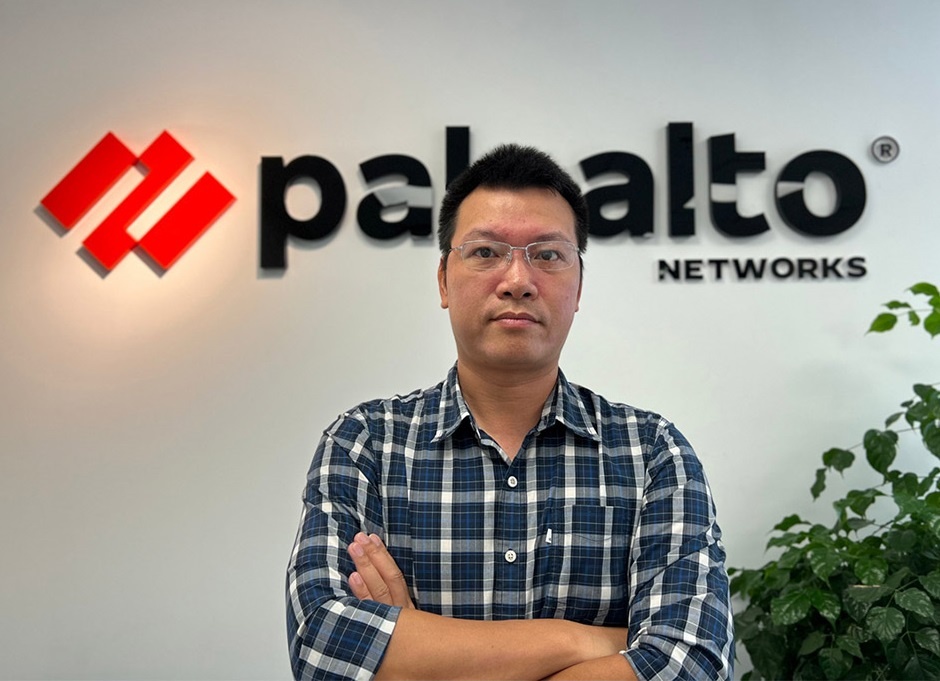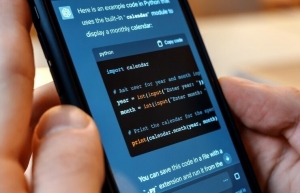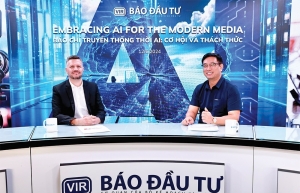AI-powered solutions to be adequate response to threats
According to Gartner Research, AI software spending is set to reach $297.9 billion by 2027, exhibiting a compound annual growth rate of 19.1 per cent. The market growth is expected to accelerate from 17.8 per cent in the next five years, peaking at 20.4 per cent by 2027.
 |
| Hoang Quang Huy, country manager for Vietnam Palo Alto Networks |
Notably, investment in generative AI software is projected to surge from 8 per cent of total AI software spending in 2023 to a substantial 35 per cent by 2027. Companies are actively expanding their open-web infrastructure, automating various tasks in the process. Looking ahead to 2024, the industry’s focus is anticipated to shift towards fortifying and safeguarding these crucial components.
An increasing number of organisations are experiencing heightened risks due to rapidly growing cyber threats. Essential services, such as healthcare and finance, are facing the brunt of various AI-enabled phishing and ransomware attacks. In Vietnam, for example, there has been a resurgence of deep fakes and photos enhanced with AI, which are being shared on social media.
The surge in AI adoption introduces new risks, as hackers exploit the technology for data breaches or to compromise entire network systems. They employ AI-supported strategies to steal social media profiles, deceive users, and cause significant harm to individuals and brands.
Despite these risks, the utilisation of AI applications offers numerous benefits across various domains. In cybersecurity, experts now have access to AI-powered tools that enable them to tackle large volumes of incidents with minimal human interference.
However, AI tools are increasingly available at low prices, especially on the dark web, lowering the barriers for threat actors. This allows them to scale their attacks and execute them with greater speed. With AI, breaches become more complex and targeted, making them harder to detect.
Generative AI tools support the creation of deep fakes, easy image editing, and the hacking of existing AI models through methods such as data poisoning. AI model manipulations have become significant concerns, demonstrating how AI can perpetuate fraud or malicious activities beyond the traditional cyber ecosystem.
Deep fake content has been used by scammers to create fake identities that replicate a victim’s face, voice, and writing style based on information collected from their social media accounts. The increasing adoption of generative AI is enabling more deep fake content, leading to more identity theft, which significantly impacts various industries.
For example, according to the Ministry of Information and Communication, in the first half of 2023, more than 95 per cent of phishing attacks in Vietnam affected the banking and finance sector.
A recent study by Unit 42 of Palo Alto Networks noted up to 118 daily detections of ChatGPT-related malicious URLs. There has been a rush to register domains related to OpenAI and ChatGPT, many of which contain malware or aim to steal personal information.
In the digital era, no industry is immune from cyber-attacks. Cybersecurity must be viewed as a business investment, not merely a cost, regardless of sector or company size. It is essential for any organisation to be proactive rather than reactive, with a well-defined strategy and processes in place.
AI-powered cybersecurity solutions are crucial in countering the escalating threats in the digital realm. Beyond reactive defence, AI introduces a transformative and proactive approach, delivering numerous benefits to businesses. By harnessing best-in-class AI and machine learning (ML) capabilities, organisations gain the agility to dynamically respond to emerging challenges.
Efficient data analysis is a key advantage, with AI and ML swiftly processing vast datasets to identify subtle patterns indicative of potential threats. This proactive stance is vital for staying ahead of zero-day threats, providing real-time insights into evolving attack vectors. AI-driven automation enhances response capabilities, reducing human error and enabling precise, rapid countermeasures against sophisticated cyber threats.
Precision AI by Palo Alto Networks, built on traditional AI/ML approaches but customised for security, is expected to be a game-changer that will create a new paradigm in security, where the defender is ahead of the adversary. This proprietary innovation combines ML and GenAI to deliver real-time protection, helping enterprises stay ahead of adversaries and secure their networks and infrastructure more effectively.
Moreover, in an increasingly interconnected world, a zero -trust approach is highly recommended to address the security challenges that critical infrastructure environments face. It creates the level of cyber resilience that modern organisations need and provides a consistent experience for users. The approach eliminates implied trust: every user is authenticated, every access request validated, and all activities continuously monitored, regardless of location.
Authorisation is required for every network access, even if previously granted. Beyond that, businesses must prioritise continuous training, knowledge enhancement, and fostering individual self-awareness among their employees to ensure preparedness against potential threats.
Today, more leaders are treating cybersecurity as a strategic business enabler crucial to long-term success. As businesses continue to shift to the cloud and hybrid work becomes a mainstay, cybersecurity needs to be integrated with business strategy as an investment to ensure leaders have the security infrastructure to overcome any cyber challenges.
 | Malaysia, China strengthen cooperation in AI Malaysian Transport Minister Anthony Loke on May 31 said that his country wants to strengthen cooperation with China in artificial intelligence (AI) with focus placed on education and training. |
 | First Al movie on domestic violence prevention, control to debut Director Pham Vinh Khuong said he is making a short film using artificial intelligence (AI) on the topic of domestic violence, aiming to contribute to educating the community, especially young people, and calling for their efforts to prevent and combat this problem. |
 | Firms should focus on Gen Z for AI boost As AI and its applications expand across various industries, Gen Z, being the first generation to be reared on social media and handheld electronic devices, is seen as the key to enhancing the competitiveness of businesses in the new economy. |
 | Apple faces pressure to deliver on AI at developer conference Apple is expected to make the case next week that it is not being left behind as tech world rivals blaze ahead with artificial intelligence. |
 | New AI offerings pose more questions The AI explosion is continuing at pace with new offerings from the biggest tech groups in the world, but ethical concerns and investing considerations are taking up more focus as industries like the media and manufacturing adjust their priorities. |
What the stars mean:
★ Poor ★ ★ Promising ★★★ Good ★★★★ Very good ★★★★★ Exceptional
Related Contents
Latest News
More News
- Citi economists project robust Vietnam economic growth in 2026 (February 14, 2026 | 18:00)
- Sustaining high growth must be balanced in stable manner (February 14, 2026 | 09:00)
- From 5G to 6G: how AI is shaping Vietnam’s path to digital leadership (February 13, 2026 | 10:59)
- Cooperation must align with Vietnam’s long-term ambitions (February 13, 2026 | 09:00)
- Need-to-know aspects ahead of AI law (February 13, 2026 | 08:00)
- Legalities to early operations for Vietnam’s IFC (February 11, 2026 | 12:17)
- Foreign-language trademarks gain traction in Vietnam (February 06, 2026 | 09:26)
- Offshore structuring and the Singapore holding route (February 02, 2026 | 10:39)
- Vietnam enters new development era: Russian scholar (January 25, 2026 | 10:08)
- 14th National Party Congress marks new era, expands Vietnam’s global role: Australian scholar (January 25, 2026 | 09:54)

 Tag:
Tag:














 Mobile Version
Mobile Version